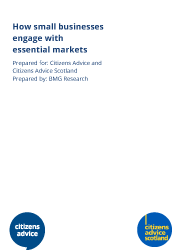How small businesses engage with essential markets
 Domestic consumers and many small businesses suffer from the same time pressures and knowledge gaps, as well as a lack of information and responsive services. While small businesses often engage with markets with the same level of expertise as domestic consumers, they frequently enjoy fewer protections.
Domestic consumers and many small businesses suffer from the same time pressures and knowledge gaps, as well as a lack of information and responsive services. While small businesses often engage with markets with the same level of expertise as domestic consumers, they frequently enjoy fewer protections.
In 2014 we commissioned BMG Research to interview 2,008 small businesses across the United Kingdom in order to find out more about their experiences as consumers of essential markets. These markets were energy, water, communication and postal services (including Royal Mail and Post Office Limited).
The research provided a solid evidence base on which to grow our small business policy by helping us to understand some of the key issues that concern small business consumers as well as to provide some more information about the small business population.
It also allowed us to identify a number of specific small business types that, due to their location, structure or other factors, potentially found it more challenging to engage with essential markets. Among these groups were home-based businesses, sole traders, businesses without internet access and businesses in rural locations.
How small business engage with essential markets [ 1.3 mb], a report on the research carried out for Citizens Advice and Citizens Advice Scotland by BMG Research, explores the experiences of these businesses and whether their location or structure affects their experiences of essential markets.

